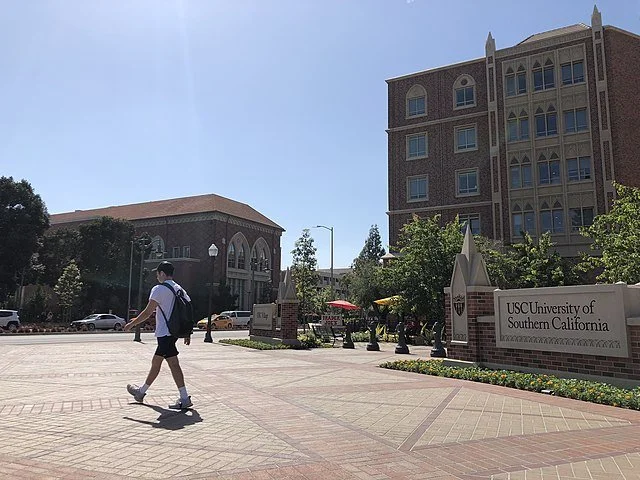Family of Dodge student killed in vehicle accident sues USC
Peng Wang, a third-year Chapman graduate student studying film production, was killed last April when an off-road vehicle overturned while maneuvering over a sand dune in Imperial Valley. WikiCommons
Peng Wang, a 29-year-old student studying film production, was assisting on a film set with two USC students when the 2022 Can-Am Maverick they were operating crashed into a sand dune and overturned.
Wang, who was not wearing a seatbelt in the vehicle, died from blunt neck trauma as a result of the off-road accident. Wang was partially ejected from the car when it flipped over, while the other two passengers survived the accident.
The family alleges in the lawsuit that USC had sanctioned the project and knew the students would be using off-road vehicles and shooting in the desert.
“Safety should trump everything on student film projects made in fulfillment of USC class requirements,” the family said in their suit. “USC has a responsibility to return the people who make its films back to their families intact. USC is liable for its negligent failure to exercise control over, and to ensure safety on, the ‘Finale’ student film project. That negligence resulted in (Wang’s) death and the ensuing damages for which plaintiffs bring suit to recover.”
Hailing from Sichuan, China, Wang went by the name “Aaron” and was well-known in Chapman’s cinematography community. He had already finished his coursework and graduate thesis for Chapman’s film production M.F.A program and was set to graduate from Dodge College of Film and Media Arts just a few weeks after his death. Chapman awarded his degree posthumously.
According to the USC website, the university owns and has a copyright for any work that uses substantial university resources. In the lawsuit, the family noted that the USC film school had approved a certification and assigned a production number for the film earlier in the month.
USC holds strong safety standards for film projects and argued that the university played no part in the events that lead to Wang’s death.
"USC was not responsible for Mr. Wang's tragic death,” USC officials told reporters. “We will be sharing the facts about our robust safety procedures and safety record in court."
The lawsuit also named the two USC students who were with Wang at the time of his death — Biangliang Li and Ting Su.
“An experienced driver, or one with proper training, familiar with the dunes would not have made this obvious error,” the family claims in the court filing.
Wang’s family claims their son was unfamiliar with the proper operation and safety protocols required for riding in the off-road vehicle. The family pointed out that Su had to help Wang put on a helmet as reasoning that he needed extra assistance with the safety precautions.
“This should have placed Su and Li on heightened alert regarding (Wang’s) lack of familiarity with the proper operation and safety protocols for the (off-road vehicle),” the family said in the suit.
The students were traveling in the Imperial Sand Dunes Recreation Area, three hours and 230 miles away from the USC campus. They were filming a short film called “Finale,” which was about a man’s travels and hallucinations in the desert, where he eventually dies.
The Dodge College Graduate Student Council set up a memorial fund to help Wang’s family cover travel and memorial expenses. Wang’s father was able to travel to Southern California for memorial services over the summer. Wang was buried in Chengdu, the capital of the Sichuan province in China.

